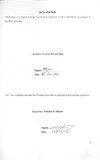Planning for novel ways of solid waste management in secondary town in Kenya, case study-Kiambu town

View/
Date
2002Author
Njau, Florence Wairimu
Type
ThesisLanguage
enMetadata
Show full item recordAbstract
Solid Waste Management is one of the challenges facing human settlements, and indeed when well managed, it can ensure that various problems associated with poor solid waste management such as land and water pollution, blocking of access ways, reduced aesthetics of the environment, health related problems and loss of revenue among others are eliminated. Good solid waste management entails involvement of all actors right from the waste generation stage up to the waste disposal stage. These actors are the central government agencies, Municipal authorities, private firms, households, Community-Based Organisations, informal Waste Collectors, Non- Governmental Organisations and business enterprises.
This paper is a report of a research study that was done to assess the solid waste management practice in Kiambu Town, which is one of the satellite towns that have strong interactions with Nairobi City. The research was focused on the roles played by Households, the municipal authority, Informal Waste Pickers and the private firms.
The major findings of the research were that solid waste in Kiambu Town constitutes of all types of waste from various human activities and that there lacks a properly establishes waste sorting policy. There also lacks strong and adequate legal framework to govern the waste management. The actors are also faced with various technical, legal, financial, informational and institutional problems and challenges. These problems and challenges affect their efficiency to carry out their positive roles and also promote their negative roles, thus leading to environmental degradation. These can be solved by developing a framework that will promote co-operation among all the actors.
The report is organised into six chapters outlining the introduction, literature review, methodology, background to the study area, data analysis and conclusions and recommendations based on the findings of the study.
Citation
Award of M.A planning degree in the department of urban and regional planning, University of NairobiPublisher
University of Nairobi
